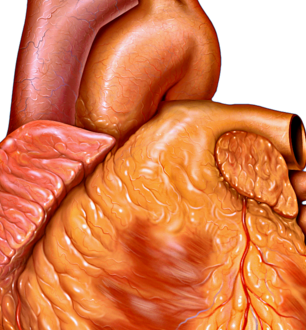When the heart’s ability to pump blood effectively is impaired or the heart muscle is damaged, heart failure results. Usually, coronary artery disease or a heart attack are to blame for the damage. Genetic illness, chronic high blood pressure, and defective cardiac valves could all be contributing factors.
Regardless of the cause, an unhealthy coronary heart is no longer able to supply the body with the oxygen-rich blood it needs.
The following warning signs and symptoms, according to the Mayo Clinic, show that your heart isn’t always functioning properly.
1. Dyspnea.
One of the most typical symptoms is shortness of breath, which can happen during any physiological activity, rest, or even sleep. It is not the best approach, because it shows up suddenly, making it impossible to lie flat. People may therefore need upper-body support when they sleep, and they may awaken feeling anxious, worn out, and restless.
2. Persistent coughing.
Another sign of severe coronary heart failure is wheezing or coughing up blood-tinged mucus that is white or pink in color. When fluid accumulates in the lungs, this symptom develops.
3. Excessive Tiredness.
Even if a person is not physically active, fatigue and weariness can make it difficult to complete daily chores effectively and leave them feeling exhausted.
When the coronary heart cannot pump enough blood to meet the body’s requirements, this symptom appears. When this happens, the body shifts blood flow from less important organs, like the muscles in the limbs, to more important organs, including the heart and brain.
4. Edema.
The swelling of the limbs, including the feet, ankles, legs, and abdomen, is known as edema and is caused by the accumulation of extra fluid in physical tissues. Additionally, it may lead to weight problems, which increase the risk of heart failure.
Blood returns to the heart when the heart’s pumping charge slows, causing fluid to build up in the tissues. The kidneys can’t work correctly as a result, excreting less salt and water, which causes tissue fluid retention.
5. Angina.
Your heart isn’t always working properly if you experience any of the following symptoms: squeezing, tightness, tension, or heaviness. Heart pain is sometimes described as feeling like an elephant is sitting on one’s chest.
6. Leg cramps.
Insufficient blood flow in the arteries of the legs should signal inadequate blood flow in the heart’s arteries. You should be tested for peripheral artery disease if you experience leg cramps, have trouble walking far, or feel pain in your legs even when you’re not moving (PAD).
 Home Of Ghana News Ghana News, Entertainment And More
Home Of Ghana News Ghana News, Entertainment And More





